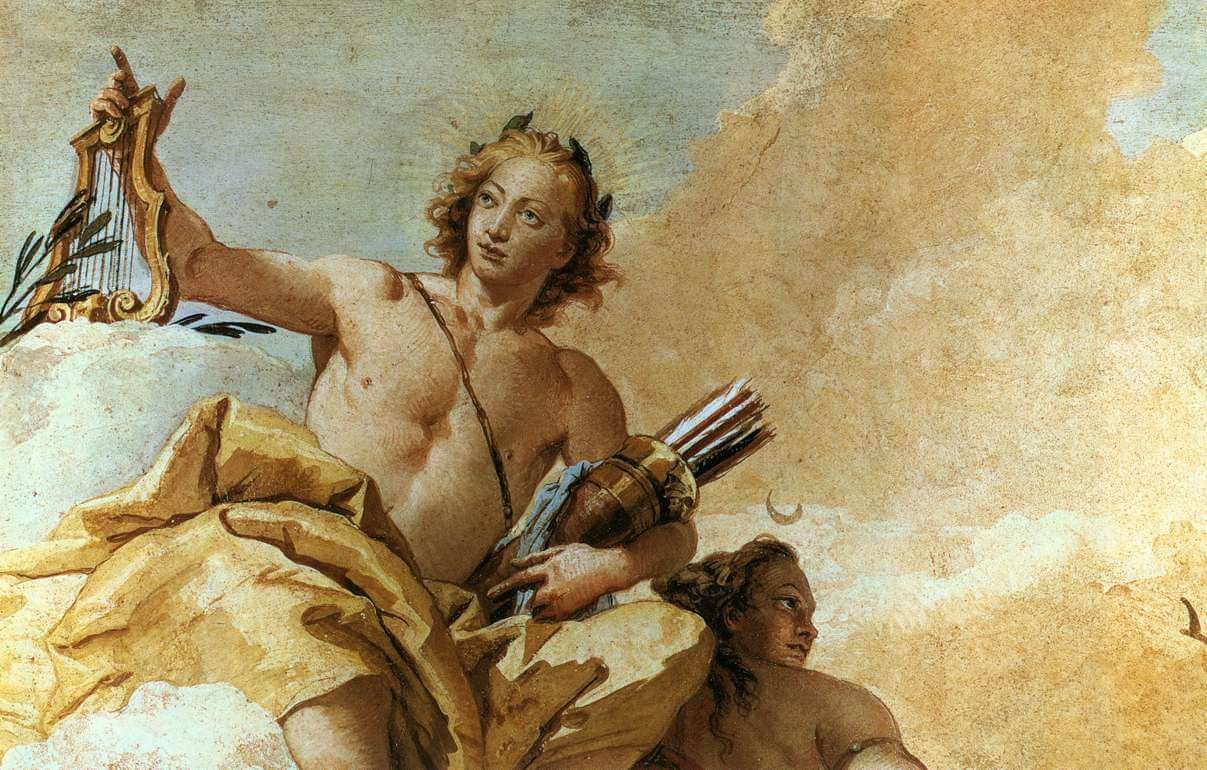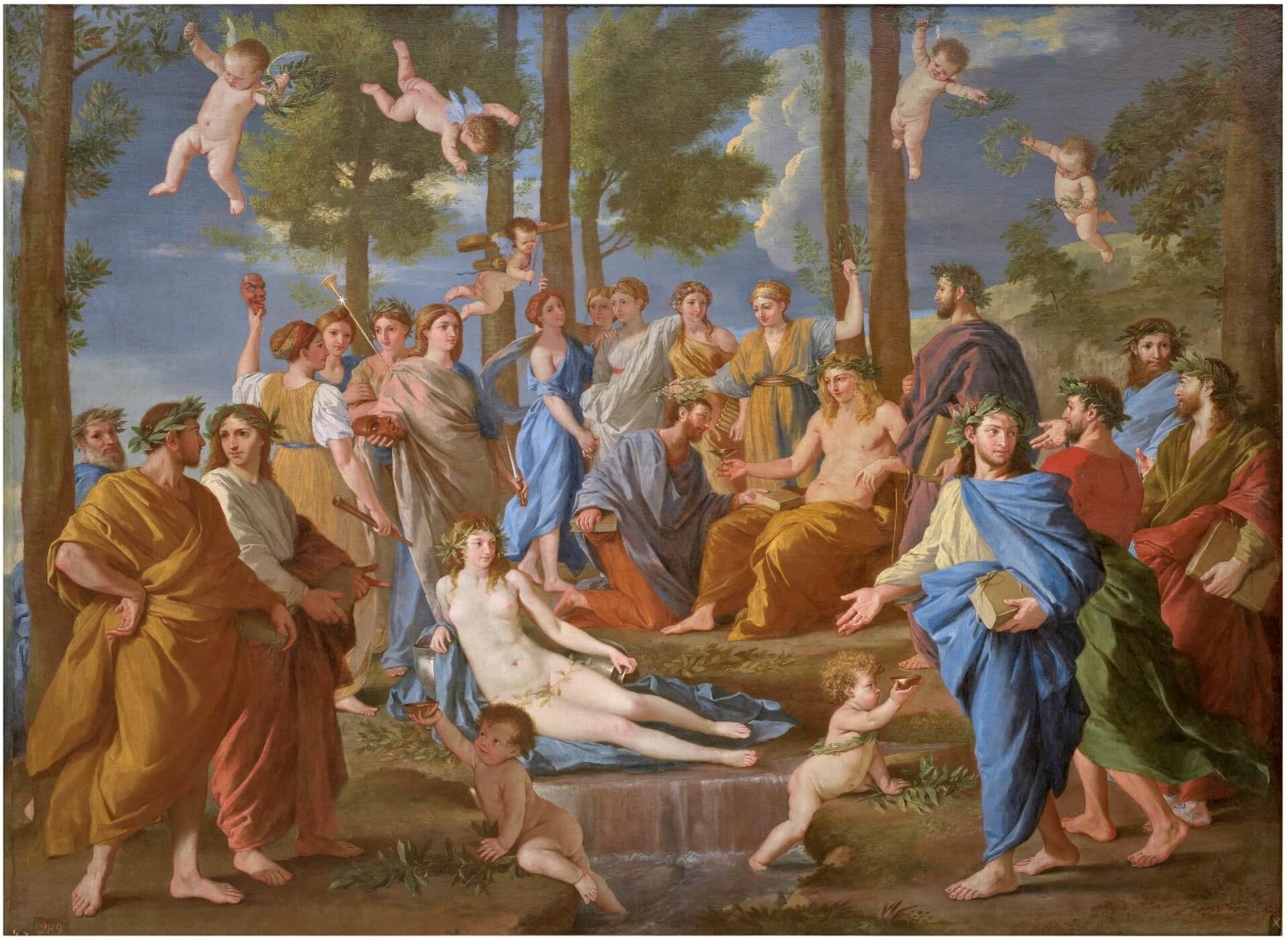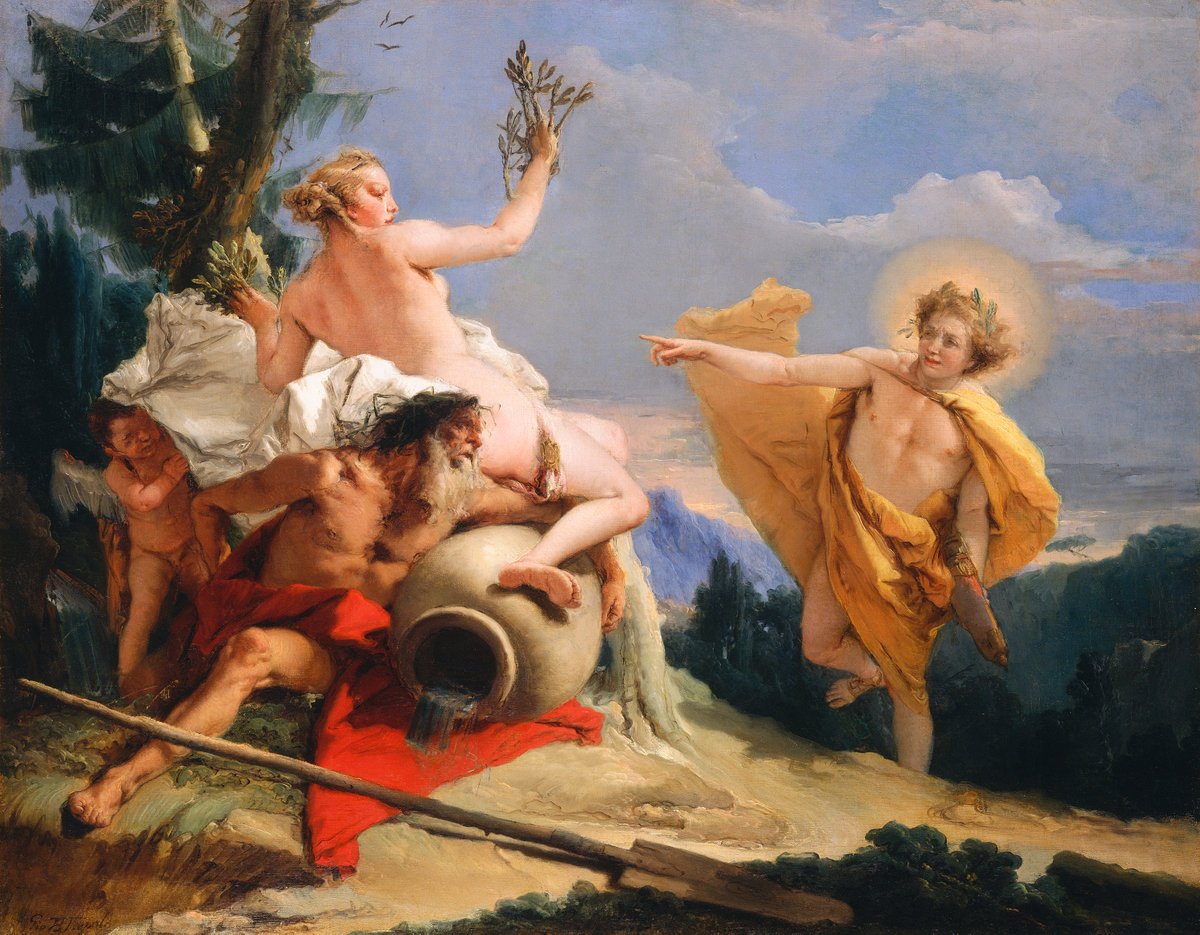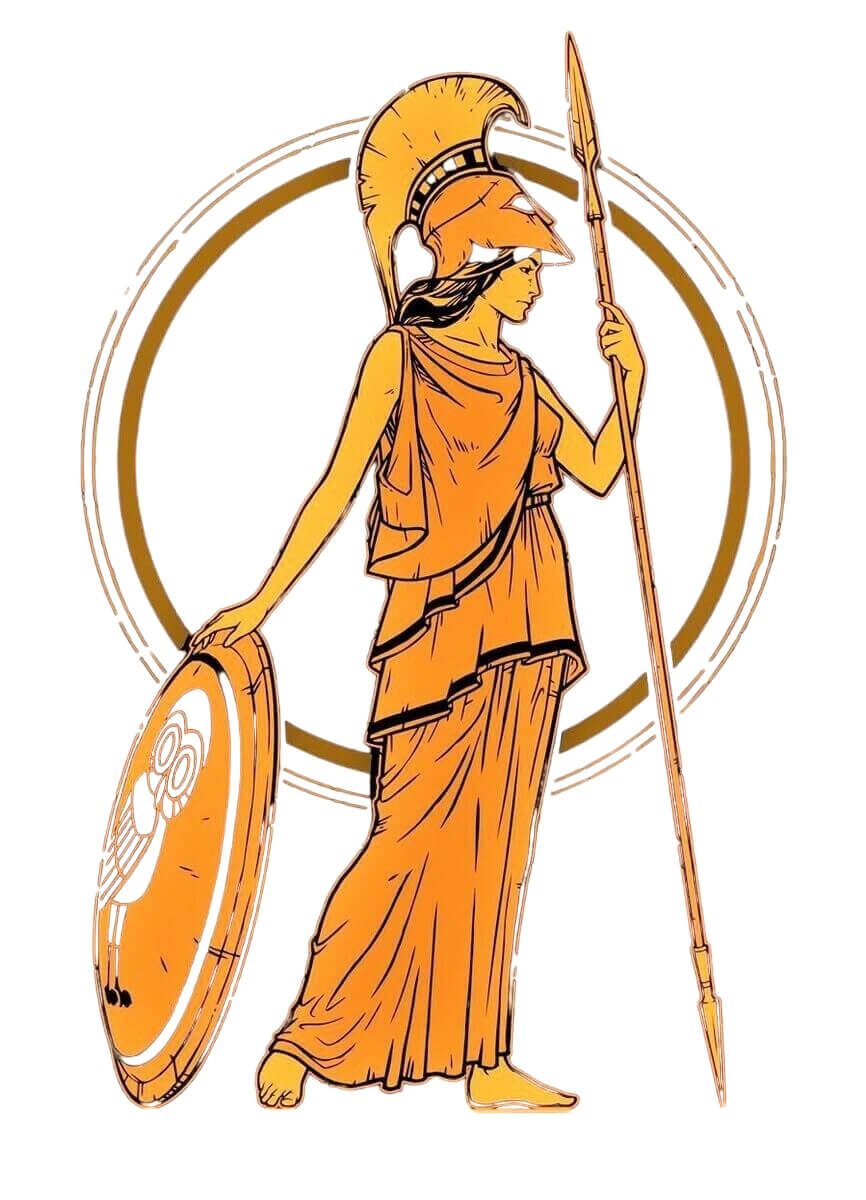Apollo: The god of Music, prophecy and healing

In Greek Mythology Apollo is the god of music, prophecy, poetry and healing. He is the son of Zeus and Leto, and the twin brother of the goddess Artemis. Frequently depicted as an archer, he was a skillful master of bow and lyre. He had presided over the nine muses, dance, music and all kind of ancient poetry.
Apollo’s prophetic gift
None of the immortals can compare in beauty with Apollo! Eternally young and sagacious, he is a tall, slender, golden-haired god. His shrewd, clear eyes see everything that happens on earth and what is destined to happen in the future. The ancient Greeks thought, that none of the gods knew the future better than he did. Thus the people of Hellas built many temples of Apollo with oracles – special places where everyone could get a prediction. The most honored was the oracle in the sacred city of Apollo – Delphi.
Apollo and Python
Four days after his birth, Apollo grew up strong and ready for revenge, which should be taken upon the giant serpent Python, that pursued his pregnant mother Leto all around the world. Finding the dragon on the spurs of Mount Parnassus, the golden-haired god fired his glittering arrows at him. Python fled from Apollo all the way to the sacred Delphi, where he tried to hide in the ancient shrine of Gaea (personification of the Earth in the ancient Greek mythology).
However, Apollo became furious and dared to profane the sacred place. He killed Python with his bow and arrows and extinguished his blood debt. Zeus appeared before Apollo afterwards and claimed him to be cleansed after the sacrilege of Gaea’s shrine. The great archer followed the request of his father and purified himself on the island of Crete. He returned subsequently to Delphi and founded an oracle and his own sanctuary. Pythian Games were established here, to pay amends for the death of Gaea’s mythical creature.
The priestess Pythia
Here in Delphi Apollo gave answers to people and questioners through the priestess, named Pythia. She was sitting on a special tripod over a crevice from which rose the vapors that she used to inhale.
Having come to a state of frenzy, she was beginning to shout out fragmentary incoherent words, which were carefully recorded by the Delphic priests. A time after, the ecclesiastics were composing a poetic answer from these utterances and always gave it to the questioner.
All the answers given to a question were made in such a way that several opposite interpretations could be possible. For example, the Lydian king Croesus, had asked whether to start or no the war against Persia. Thereupon he received a response that by starting it, he would destroy a great kingdom. In the prediction, of course, was not specified which kingdom would be devastated. Croesus understood that the great kingdom was the Persian, but finally it resulted to be his own homeland.
Apollo and the Muses
Apollo is the god of archery and a wonderful musician. As a matter of fact, he is famous because of the magic sounds of his lyre. Even though he did not obtain his musical instrument by himself. In fact, according to the legends the recently-born Hermes invented the musical instrument and exchanged it for the cows of Apollo, after having stolen them in his first day of life.

That being so, it might be an allusion to Apollo, as an improper master of arts, not even able to craft his own musical instrument. Although of such a story the Greeks considered the golden-haired god as the inspirer of the arts in Ancient Greece. He always travelled in company of the nine Muses and played the role of their patron.
On the other hand, the Muses were mentioned by the first time in Hesiod’s Theogony. An epic poem about the origins and genealogy of the Greek gods. They appear next to Apollo and Zeus, looking superficial and of a diplomatic use.
The Muses provide the gift of sweet speech and gentle words. Owing to Apollo and the muses there are singers and harpers in the world. Although of having a poor difficult life, the man forgets his sorrows and pain, meanwhile he hears a singer, playing a musical instrument or chanting a song about the great deeds of the heroes and the gods of Olympus.
However, it is just a song or melody, which solves neither miseries nor troubles of the humankind, acting like a sedative for a short period of time. Zeus controls and manipulates the Muses for his own iniquitous purposes. As if it was an assembly with princes, who persuade people with ease, inclining them towards their own opinion. Nothing is what they are capable of; nothing is what they want people to think or believe. Just a bunch of superficial songs, that make persons follow the path of nihil.
Thus the best music is not even known. The meaning and inspiring soul are substituted by the fine sounds of a panpipe and useless musical rumble. Idle, meaningless words in the poetry, obstruct the minds of mortals, so they could never develop their own perspicacity and shrewdness – “The daughters of Pegasus dictate sweetest songs” Heroides 15-21 by Ovid.
Nonetheless, after having been the father of almost entire Olympus, Zeus had given birth to Athena. The splendorous goddess of wisdom, was born from his ill forehead, full of pain. She could have put an order in the tiring mess of Olympus and its slothful festivity. The despair of the humankind and its sufferings needed to come to an end. She was destined to be the ultimate headache of Zeus. Athena, the searcher and provider of truth and justice.
For that reason Hesiod also mentioned Athena in his Theogony. She looked like a great warrioress, predestined to subdue the muses and the entire Olympus for the sake of humanity. The ancient Greeks admired philosophy and big sciences, such as mathematics, cosmology, geometry, medicine and physics. They had preferred Athena to the poetry and music on the sunny groves of Apollo. Thereupon the Greek theatre and written poetry had grown up till the heights of great social majesty and six centuries later, the roman poet Ovid, had endowed the Muses and Athena with a special revolutionary meaning.
He had referred to the Muses as the daughters of Pegasus. That is to say the children of the winged horse, which flew away from the decapitated corpse of Medusa, when Perseus had slayed her, being helped by Athena. Insofar as Medusa is the lies and acts of tyranny, Pegasus might be a certain remainder of these despotic lies and acts. Therefore, his daughters, the Muses are unworthy to represent the Art.
After having touched the river Helicon with his hooves, Pegasus gave birth to four sacred springs, therefrom appeared the Muses. A time after, Athena tamed the winged stallion and presented him to the Muses. In other words, she demonstrated her supremacy over them, highlighting that she is the true goddess of Art. In contrast the Muses play the role of Zeus’s puppets, whom he uses to foul people and ingrain ignorance all around Hellas and beyond.
In fact, the Greco-Roman poets wrote about the ascent of Pegasus till the clouds of Olympus, after his birth. The treacherous horse showed reverence towards Zeus, who entrusted him the labor of bringing thunder and lightning from Olympus. Perhaps, another sort of suffering and acts of tyranny for the humankind.
Apollo was someone, not especially good or unique at anything. There is a better archer and musician – Artemis and Hermes. Therefore, he accepted to work for the father of lies and supreme king of Olympus. The god of prophecy wasn’t capable to project the perfection and great art by himself, thus he was never especially fond of justice, in such a way as he never stood openly against it.
Asclepius and his children
The son of Apollo was Asclepius, the most skillful of all physicians. He cured all diseases and wounds and even tried to break the world order, intending to raise the dead. Of course, the gods could not allow such a desecration, therefore Zeus incinerated Asclepius with his lightning.
Even though a time after, Zeus attended Apollo’s dramatic plea and resurrected the doctor, taking him to Olympus. This way, Apollo’s son began to be the god of healing. Henceforth the sons of Asclepius became skillful healers, and from them had begun the family of doctors, named Asclepiades. At this time Asclepius’s daughter Hygeia became the goddess of Good Health (we still using her name nowadays “hygiene”). And his other daughter Panakeia (Cure-All) healed people from all the pains, as the goddess of universal health.
Apollo as the patron of farmers and shepherds
Apollo was not only the god of music, healing and prophecy. The Greek farmers also honored him as the god of herds and crops. Insomuch as he protected people against wild animals and rodents such as mice. The shepherds called him Lyceius, considering that he protected their flocks from wolves. So it turned out that Apollo had many different names and patronized many people in Greece.
The god of Music and Daphne
Apollo’s love for the beautiful nymph Daphne ended very sadly. Aphrodite had a son – the merry, quick and naughty boy, named Eros. He flied with his golden wings over the entire world, land and sea. In his hands he always held a small golden bow of love. Hence no one was safe from the arrows of the varmint Eros, even the thunderer Zeus or Apollo could be struck by them.

Without inflicting pain, the arrows pierced into hearts of the mortals and gods, flaring up the flame of love. These arrows didn’t always bring joy and happiness. They often caused suffering, agony of love and even death. Many People suffered a harsh torment, and the gods felt very distressed and anguished.
Once in time, the golden-haired Apollo laughed at Eros’s small bow. Therefore, the little boy became angry and sent two arrows to avenge his pride. One, which excited love, into the heart of Apollo, and the other, love-killing – into the heart of the nymph Daphne.
A short time after, Apollo met the beautiful nymph and fell in love with her. But as soon as Daphne had seen the golden-haired god, she ran away with the speed of the wind. “Stop, beautiful nymph! – exclaimed worried, Apollo. Why are you running away from me, like a sheep, chased by a wolf? I am not your enemy! You are hurting your feet with the thorny grass. Don’t run so fast, since love makes me run in your footsteps!” But Daphne didn’t stop and ran faster and faster.
When her strength began to fade away and Apollo almost had caught her, Daphne begged her father, the river god Peneus, to take her beauty away. “Help me, father! Take my appearance away from me – it causes me only suffering!” As soon as she said so, her body became numb and thin bark covered it. Her hair turned into leaves and her hands into branches. Daphne became a laurel tree.
For a long time, stood the saddened Apollo next to it. For a long time, he heard the beating of Daphne’s heart under the tree bark. But finally he needed to go away and said: “May your green never wither, oh my lovely, amazing laurel! Stay viridescent and young forever!” And his desire came true. Apollo himself wore a wreath of laurel from that time on and decorated his lyre and quiver of arrows with the green leaves of this beautiful fabulous tree.
